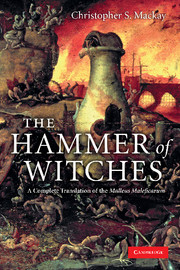Book contents
Introductory Question
from PART III
Published online by Cambridge University Press: 05 August 2015
Summary
[TT] WHETHER sorcerers and those who abet, receive and defend them are subject in such a way to the ecclesiastical passing of judgment by diocesans and to the civil passing of judgment, that the inquisitors of heretical depravity can be relieved of conducting an inquisition into them.
[AG 1] It is argued that this is so. In Chapter “Accusatus” § “Sane” (Liber Sextus) it says, “Since the business of the Faith, to which the highest priority is given, should not be hindered by other activities, inquisitors into the plague of heresy appointed by the Apostolic See should not intervene in acts of divination or fortune telling or in punishing those who pursue such practices unless they manifestly smack of heresy. Instead, they should leave such people to be punished by the judges responsible for them.” There appears to be no obstacle in the fact that the Heresy of Sorceresses is not explicitly mentioned in the passage, both because they are punished with the same penalties in the forum of the conscience (“If the sin of the diviners and sorcerers is hidden, forty days' penance intervenes; if it is notorious, the Eucharist is denied, and the same judgment is decreed for those covered by the same penalty”: “Consecration,” Distinction 2, “Pro Dilectione”) and also because there seems to be the same instance of guilt in each case, since|sorceresses expect and demand from demons harm to creatures, just as fortune-tellers receive a judgment by lot. Thus, in each case they demand unlawfully from creatures what should be asked of God alone, and for this reason in each case there is the sin of idolatry. In this sense it is noted in Ezekiel 21 [: 21] that the king of Babylon stood at a crossroads at the head of two roads and questioned the idols by making a pile of arrows.
- Type
- Chapter
- Information
- The Hammer of WitchesA Complete Translation of the Malleus Maleficarum, pp. 477 - 502Publisher: Cambridge University PressPrint publication year: 2009



